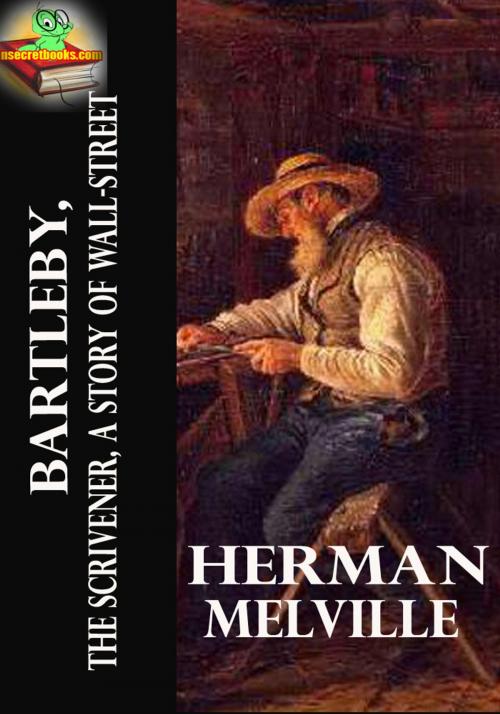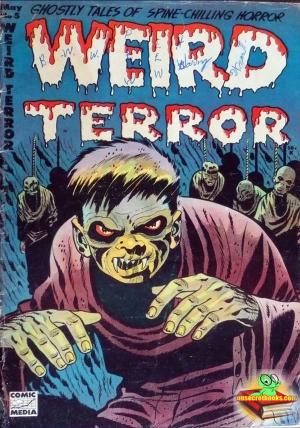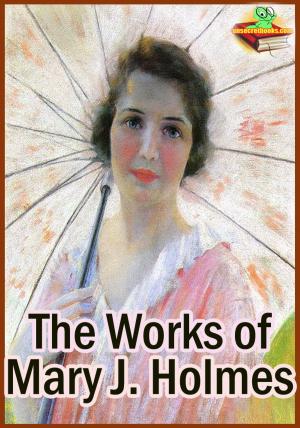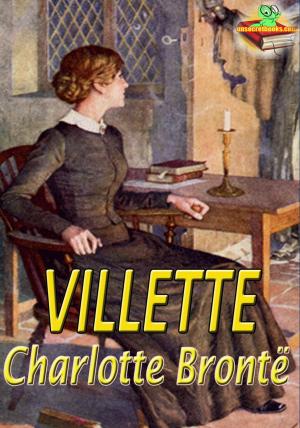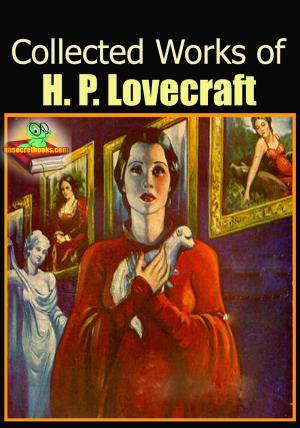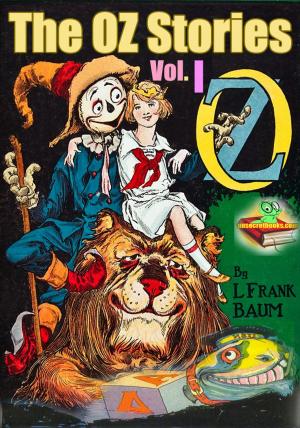Bartleby, the Scrivener: A Story of Wall Street, Short Story
(With Audiobook Link)
Fiction & Literature, Action Suspense, Short Stories, Romance| Author: | Herman Melville | ISBN: | 1230000155496 |
| Publisher: | Unsecretbooks.com | Publication: | July 26, 2013 |
| Imprint: | Language: | English |
| Author: | Herman Melville |
| ISBN: | 1230000155496 |
| Publisher: | Unsecretbooks.com |
| Publication: | July 26, 2013 |
| Imprint: | |
| Language: | English |
Bartleby, the Scrivener: A Story of Wall Street is a short story by the American writer Herman Melville (1819–1891). It first appeared anonymously in two parts in the November and December 1853 editions of Putnam's Magazine, and was reprinted with minor textual alterations in his The Piazza Tales in 1856.
At the start of the story, the narrator already employs two scriveners, nicknamed Nippers and Turkey, to copy legal documents by hand. Nippers (the younger of the two) suffers from chronic indigestion, and Turkey is an alcoholic, but the office survives because in the mornings Turkey is sober and Nippers is irritable, while in the afternoons Nippers has calmed down and Turkey is drunk. Ginger Nut, the office boy, gets his name from the little cakes he brings the two scriveners. An increase in business leads the narrator to advertise for a third scrivener, and he hires the forlorn-looking Bartleby in hopes that his calmness will soothe the temperaments of Nippers and Turkey.
At first, Bartleby appears to be a boon to the practice, as he produces a large volume of high-quality work. One day, though, when asked by the narrator to help proofread a copied document, Bartleby answers with what soon becomes his stock response: "I would prefer not to". To the dismay of the narrator and to the irritation of the other employees, Bartleby performs fewer and fewer tasks around the office. The narrator makes several attempts to reason with him and to learn something about him but Bartleby offers nothing but his signature "I would prefer not to". One Sunday the narrator stops by the office unexpectedly and discovers that Bartleby has started living there. The loneliness of Bartleby's life impresses him: at night and on Sundays, Wall Street is as desolate as a ghost town and the window in Bartleby's corner allows him no view except that of a blank wall three feet away. The narrator's feelings for Bartleby alternate between pity and revulsion.
For a while Bartleby remains willing to do his main work of copying but eventually he ceases this activity as well, so that finally he is doing nothing. The narrator finds himself unable to make Bartleby leave; his unwillingness or inability to move against Bartleby mirrors Bartleby's strange inaction. Tension gradually builds as the narrator's business associates wonder why the strange and idle Bartleby is ever-present in the office.
Sensing the threat of a ruined reputation but emotionally unable to throw Bartleby out, the exasperated narrator finally decides to move out himself, relocating his entire business and leaving Bartleby behind. Soon the new tenants of the old space come to ask for his help: Bartleby still will not leave. Although they have thrown him out of the rooms, he now sits on the stairs all day and sleeps in the building's front doorway. The narrator visits Bartleby and attempts to reason with him. Feeling desperate, the narrator now surprises even himself by inviting Bartleby to come and live with him at his own home. Bartleby, alas, "would prefer not to."
Deciding to stay away from work for the next few days for fear he will become embroiled in the new tenants' campaign to evict Bartleby, the narrator returns to find that Bartleby has been forcibly removed and imprisoned at The Tombs. The narrator visits him, finding him even glummer than usual. As ever, Bartleby rebuffs the narrator's friendliness. Nevertheless, the narrator bribes a turnkey to make sure Bartleby gets good and plentiful food. When the narrator visits again a few days later, he discovers that Bartleby has died of starvation, having apparently preferred not to eat.
Some time afterward, the narrator hears of a rumor to the effect that Bartleby had worked in a dead letter office but had lost his job there. The narrator reflects that the dead letters would have made anyone of Bartleby's temperament sink into an even darker gloom. Dead letters are emblems of human nature and the plight of failing. Through Bartleby, the narrator has glimpsed the world as the miserable scrivener must have seen it. The closing words of the story are the narrator's resigned and pained sigh: "Ah Bartleby! Ah humanity!".
Bartleby, the Scrivener: A Story of Wall Street is a short story by the American writer Herman Melville (1819–1891). It first appeared anonymously in two parts in the November and December 1853 editions of Putnam's Magazine, and was reprinted with minor textual alterations in his The Piazza Tales in 1856.
At the start of the story, the narrator already employs two scriveners, nicknamed Nippers and Turkey, to copy legal documents by hand. Nippers (the younger of the two) suffers from chronic indigestion, and Turkey is an alcoholic, but the office survives because in the mornings Turkey is sober and Nippers is irritable, while in the afternoons Nippers has calmed down and Turkey is drunk. Ginger Nut, the office boy, gets his name from the little cakes he brings the two scriveners. An increase in business leads the narrator to advertise for a third scrivener, and he hires the forlorn-looking Bartleby in hopes that his calmness will soothe the temperaments of Nippers and Turkey.
At first, Bartleby appears to be a boon to the practice, as he produces a large volume of high-quality work. One day, though, when asked by the narrator to help proofread a copied document, Bartleby answers with what soon becomes his stock response: "I would prefer not to". To the dismay of the narrator and to the irritation of the other employees, Bartleby performs fewer and fewer tasks around the office. The narrator makes several attempts to reason with him and to learn something about him but Bartleby offers nothing but his signature "I would prefer not to". One Sunday the narrator stops by the office unexpectedly and discovers that Bartleby has started living there. The loneliness of Bartleby's life impresses him: at night and on Sundays, Wall Street is as desolate as a ghost town and the window in Bartleby's corner allows him no view except that of a blank wall three feet away. The narrator's feelings for Bartleby alternate between pity and revulsion.
For a while Bartleby remains willing to do his main work of copying but eventually he ceases this activity as well, so that finally he is doing nothing. The narrator finds himself unable to make Bartleby leave; his unwillingness or inability to move against Bartleby mirrors Bartleby's strange inaction. Tension gradually builds as the narrator's business associates wonder why the strange and idle Bartleby is ever-present in the office.
Sensing the threat of a ruined reputation but emotionally unable to throw Bartleby out, the exasperated narrator finally decides to move out himself, relocating his entire business and leaving Bartleby behind. Soon the new tenants of the old space come to ask for his help: Bartleby still will not leave. Although they have thrown him out of the rooms, he now sits on the stairs all day and sleeps in the building's front doorway. The narrator visits Bartleby and attempts to reason with him. Feeling desperate, the narrator now surprises even himself by inviting Bartleby to come and live with him at his own home. Bartleby, alas, "would prefer not to."
Deciding to stay away from work for the next few days for fear he will become embroiled in the new tenants' campaign to evict Bartleby, the narrator returns to find that Bartleby has been forcibly removed and imprisoned at The Tombs. The narrator visits him, finding him even glummer than usual. As ever, Bartleby rebuffs the narrator's friendliness. Nevertheless, the narrator bribes a turnkey to make sure Bartleby gets good and plentiful food. When the narrator visits again a few days later, he discovers that Bartleby has died of starvation, having apparently preferred not to eat.
Some time afterward, the narrator hears of a rumor to the effect that Bartleby had worked in a dead letter office but had lost his job there. The narrator reflects that the dead letters would have made anyone of Bartleby's temperament sink into an even darker gloom. Dead letters are emblems of human nature and the plight of failing. Through Bartleby, the narrator has glimpsed the world as the miserable scrivener must have seen it. The closing words of the story are the narrator's resigned and pained sigh: "Ah Bartleby! Ah humanity!".
